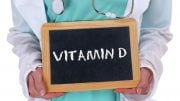
A clinical trial has found that vitamin D supplements may reduce the risk of major cardiovascular events, including heart attacks, in people over 60. The study revealed a 9% decrease in such events among those taking vitamin D, warranting further investigation, particularly in those taking cardiovascular medications.
Findings show monthly vitamin D may prevent heart attacks in over 60s.
Vitamin D supplements may reduce the risk of major cardiovascular events such as heart attacks among people aged over 60, finds a clinical trial published on June 28 by The BMJ.
The researchers stress that the absolute risk difference was small, but say this is the largest trial of its kind to date, and further evaluation is warranted, particularly in people taking statins or other cardiovascular disease drugs.
Cardiovascular disease (CVD) is a general term for conditions affecting the heart or blood vessels and is one of the main causes of death globally. CVD events such as heart attacks and strokes are set to increase as populations continue to age and chronic diseases become more common.
Observational studies have consistently shown a link between vitamin D levels and CVD risk, but randomized controlled trials have found no evidence that vitamin D supplements prevent cardiovascular events, possibly due to differences in trial design that can affect results.
To address this uncertainty, researchers in Australia set out to investigate whether supplementing older adults with monthly doses of vitamin D alters the rate of major cardiovascular events.
Their D-Health Trial was carried out from 2014 to 2020 and involved 21,315 Australians aged 60-84 who randomly received one capsule of either 60,000 IU vitamin D (10,662 participants) or placebo (10,653 participants) taken orally at the beginning of each month for up to 5 years.
Participants with a history of high calcium levels (hypercalcemia), overactive thyroid (hyperparathyroidism), kidney stones, soft bones (osteomalacia), sarcoidosis, an inflammatory disease, or those already taking more than 500 IU/day vitamin D were excluded.
Data on hospital admissions and deaths were then used to identify major cardiovascular events, including heart attacks, strokes, and coronary revascularization (treatment to restore normal blood flow to the heart).
The average treatment duration was 5 years and more than 80% of participants reported taking at least 80% of the study tablets.
During the trial, 1,336 participants experienced a major cardiovascular event (6.6% in the placebo group and 6% in the vitamin D group).
The rate of major cardiovascular events was 9% lower in the vitamin D compared with the placebo group (equivalent to 5.8 fewer events per 1,000 participants).
The rate of heart attack was 19% lower and the rate of coronary revascularization was 11% lower in the vitamin D group, but there was no difference in the rate of stroke between the two groups.
There was some indication of a stronger effect in those who were using statins or other cardiovascular drugs at the start of the trial, but the researchers say these results were not statistically significant.
Overall, the researchers calculate that 172 people would need to take monthly vitamin D supplements to prevent one major cardiovascular event.
The researchers acknowledge that there may be a small underestimate of events and say the findings may not apply to other populations, particularly those where a higher proportion of people are vitamin D deficient. However, this was a large trial with extremely high retention and adherence, and almost complete data on cardiovascular events and mortality outcomes.
As such, they say their findings suggest that vitamin D supplementation may reduce the risk of major cardiovascular events. “This protective effect could be more marked in those taking statins or other cardiovascular drugs at baseline,” they add, and they suggest further evaluation is needed to help to clarify this issue.
“In the meantime, these findings suggest that conclusions that vitamin D supplementation does not alter risk of cardiovascular disease are premature,” they conclude.
Reference: “Vitamin D supplementation and major cardiovascular events: D-Health randomised controlled trial” by Bridie Thompson, research officer1, Mary Waterhouse, statistician epidemiologist1, Dallas R English, professor2, Donald S McLeod, senior research officer1, Bruce K Armstrong, professor3, Catherine Baxter, project manager1, Briony Duarte Romero, research assistant1, Peter R Ebeling, professor4, Gunter Hartel, head of statistics5, Michael G Kimlin, professor6, Sabbir T Rahman, research officer1, Jolieke C van der Pols, associate professor7, Alison J Venn, professor8, Penelope M Webb, professor1, David C Whiteman, professor1, Rachel E Neale,, 28 June 2023, BMJ.
DOI: 10.1136/bmj-2023-075230
Funding: National Health and Medical Research Council









Do you realized, that it may have nothing to do with vitamin D…but just activity of the person in open air environment?! That is why cardio function is shady and preventing any heart issues! You have to concluded all effective elements before making any out come, thanks
Something the authors of this study should inform the general public before heart patients start taking excessive doses of vitamin D3; the half life of vitamin D3 is about 60 days in our tissues. Thus, if people keep taking 125% of daily requirement (or higher %) on a daily basis, they an end up with vitamin D toxicity.The result: increased calcium mobilization, and perhaps increased chance of calcium deposition in arteries. Also, many multivitamin supplements have vitamin D3. Heart patients need to count the vitamin D3 dosage in all the supplements before they start taking vitamin D3 separately.